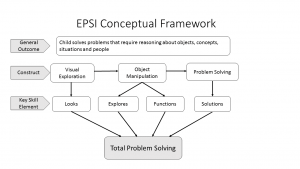Early Problem Solving Indicator
One way for early interventionists to measure progress toward proficiency in cognitive problem solving in infants and toddlers is the Early Problem Solving Indicator (EPSI).
 The EPSI is a play-based observational measure of a child’s growth in problem solving with toys occurring during a 6-minute play period with a familiar adult.
The EPSI is a play-based observational measure of a child’s growth in problem solving with toys occurring during a 6-minute play period with a familiar adult.
Four of 5 problem solving skills were selected to comprise the EPSI based on a conceptual review of the literature and statistical validation with other measures of cognitive reasoning and problem solving. The fifth skill, Engagement, was not selected for further development because across children it tended to have a ceiling effect and restricted variation. It was not particularly sensitive to individual differences among children in the sample and growth over time.
The key skill elements with specific problem-solving properties were: Looking, Exploring, Functions, and Solutions. These skills were selected to represent the visual exploration domain (Looks), the object exploration domain (Explores and Functions), and the problem solving domain (Solutions), three skill classes of importance to children who are just acquiring problem solving skills. These key skills form a single indicator of Total Problem Solving.
